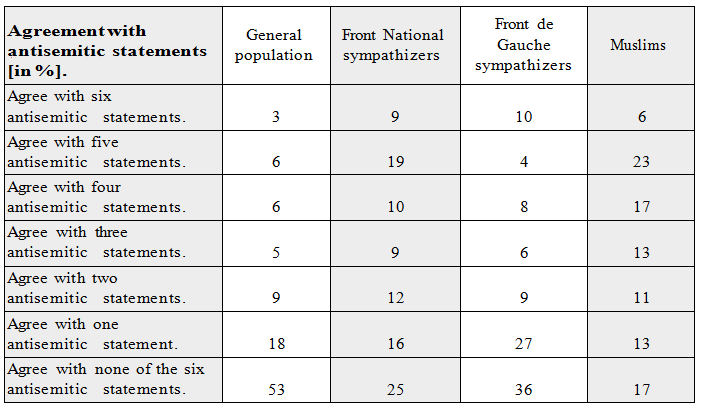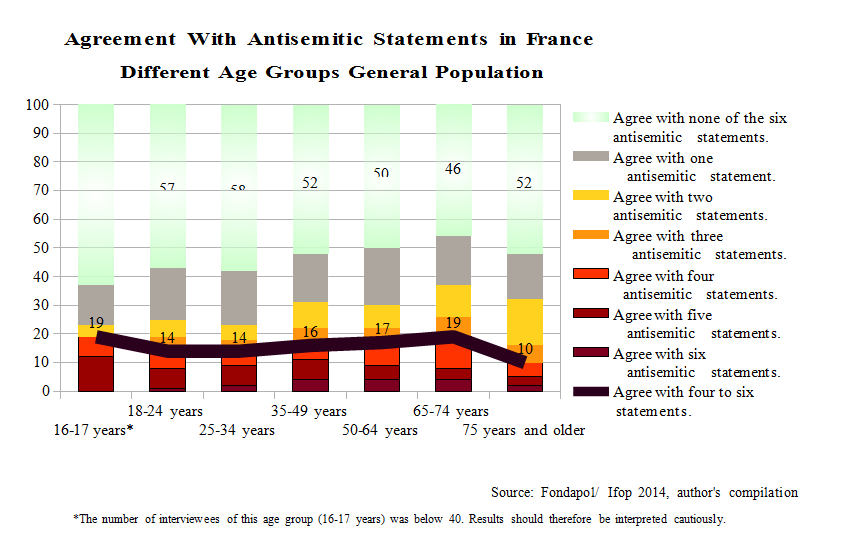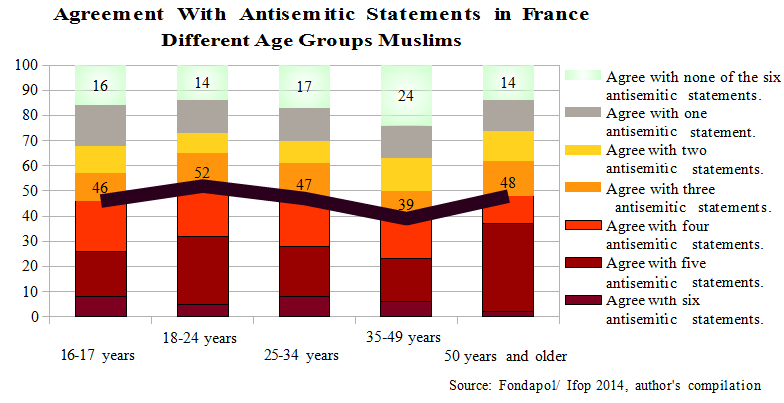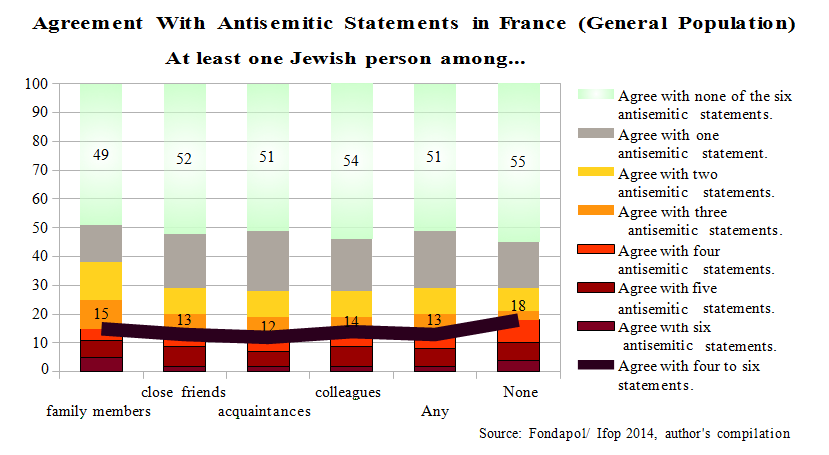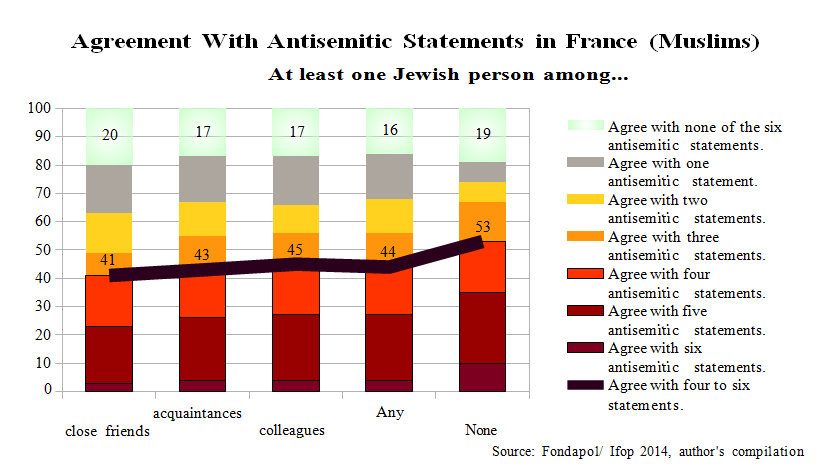Abstract
In
Western Europe, Muslims have been identified as a significant group of
perpetrators of antisemitic acts. Is the level of antisemitism higher among
Muslims than among non-Muslims? This paper will discuss European surveys on
antisemitism and compare attitudes between Muslims and non-Muslims.
While
no comprehensive study has been conducted on an international comparative scale
and most national studies focus on selective samples such as certain
ethnicities or student groups, a review of the available surveys shows a clear
tendency: antisemitic attitudes are significantly more widespread among Muslims
than among other segments of European societies. What is more, the
interpretation of Islam seems to be highly relevant.
Antisemitic
attitudes are particularly strong among believing and practicing Muslims and
correlate with authoritarian, “fundamentalist” interpretations of Islam. A
comprehensive survey on antisemitism in France is discussed in detail.
Introduction
Since
the early 21st century, Muslims have emerged as a new group of antisemitic
perpetrators in Western Europe. Perpetrators of some of the most extreme cases
of violence against European Jews in recent years were Muslim, partly
justifying their acts with their interpretation of Islam. The most terrible
incidents include the shootings at the Jewish Museum in Brussels in May 2014,
killing four people, the murder of three children and a teacher at a Jewish
school in Toulouse in 2012, and the torture and murder of Ilan Halimi in Paris
in 2006. Statistics from France and Great Britain of the last decade show that
antisemitic perpetrators have been disproportionally of Muslim origin. Exact
numbers are difficult to establish, however, because most perpetrators have not
been identified and the rise of antisemitism cannot be attributed exclusively
to Muslims.
Cautious
estimations put the percentage of Muslim perpetrators of antisemitic incidents
in Great Britain at between 20 and 30 percent, while the percentage of Muslims
in the general population stands at 5 percent. About 30 percent of the
perpetrators of all antisemitic incidents in France in recent years have been
identified as Muslim/Arab, however the actual percentage can be estimated to be
above 50 percent.1 6 to 8 percent of the French population are Muslim. While
antisemitic acts peaked during tensions in the Israeli¬-Palestinian conflict
and the Iraq war, the annual levels of antisemitic acts have risen
significantly compared to the 1990s and cannot be attributed solely to fall out
from these conflicts. How is this reflected in antisemitic attitudes?
Antisemitic
attitudes in many Muslim-majority countries are high, including in those
countries where the majority of European Muslims (or their parents) emanate .
Indeed, the Anti-Defamation League (ADL) 2014 survey revealed that 74 percent
of the population in the Middle East and North African countries agreed with at
least six out of eleven antisemitic statements. In Algeria, the numbers rose to
87 percent, 75 percent in Egypt, 92 percent in Iraq, 81 percent in Jordan, 87
percent in Libya, 80 percent in Morocco, 74 percent in Saudi Arabia, 86 percent
in Tunisia, and 69 percent in Turkey.2 The PEW Global Attitudes Project, using
a simpler questionnaire, yielded similar results, and included Pakistan and
Indonesia.3 Levels of open antisemitic attitudes, however, are lower in
European countries (24 percent of West Europeans agreed to at least six out of
eleven antisemitic statements in the above¬-mentioned study) and most European
Muslims have lived in Europe for decades or were born and raised in European
countries.
How
extensive are antisemitic attitudes among Muslims in Europe and to what are
these attitudes ascribed? Do specific antisemitic tropes exist among European
Muslims? Combating the new threat of antisemitism in Europe cannot neglect
these questions. A review of recent surveys provides some answers.
Representative
Surveys of Attitudes Among European Muslims
Few
representative surveys have been conducted to establish levels of antisemitism
among Muslim Europeans. The lack of representative and comparative studies on a
European level leads to false generalizations about Muslims on the one hand
and, more frequently, the denial of an increased level of antisemitic attitudes
among Muslims on the other. Surveys on antisemitism that distinguish between
Muslims and non-Muslims have either been limited to certain geographical areas
or focus groups or they have been criticized (in part) for methodological reasons.
However, the sum of available studies to date provides strong evidence that the
level of antisemitism is indeed particularly high among Muslims. Furthermore,
this is related to interpretations of Islam, with some antisemitic tropes
specific to Muslim communities.4
The
only representative comparative survey of different European countries that
distinguishes between Muslims and non-Muslims was conducted by PEW Global
Attitudes Project in April 2006.5 Unfortunately, only a single question was
used to measure antisemitic attitudes.6 The study showed that Muslims in
France, Germany, and Spain were twice as likely than non-Muslims to harbor
negative view of Jews.
The
factor was almost seven for Great Britain. The difference is even greater
concerning “very unfavorable” views of Jews. In 2006, Muslims were three to ten
times more likely to harbor “very unfavorable” views of Jews than non-Muslims
in France, Germany, and Great Britain. The factor was slightly lower in Spain
where negative views of Jews were by far the highest among Muslims (60 percent)
and the general population (39 percent). Other surveys confirm particularly
high levels of antisemitic attitudes in Spain in the general population.7

Another
comparative study of antisemitism analyzed interviews (conducted in 2008) of
almost 9000 participants from Austria, Belgium, France, Germany, the
Netherlands, and Sweden. Participants were asked if they agree, disagree, or
neither agree or disagree with the statement “The Jews cannot be trusted.” The
sample consisted of about 500 interviewees in each country from each of three
groups: “natives”, “Turkish origin”, and “Moroccan origin” (except for Austria
and Sweden where no Moroccans were interviewed due to their low numbers).8 A
comparison between self-identified Christians (70 percent of the native
sample) and self-identified Muslims (97 percent of the interviewees of Turkish
and Moroccan origin) can be seen in Table 2. Whereas agreement among Christians
with the antisemitic statement “The Jews cannot be trusted” was around or below
10 percent, depending on the country, agreement among Muslims was between 30
and 60 percent. Agreement also varied along ethnic and religious lines: it was
highest among Sunnites of Turkish origin (52 percent) followed by Sunnites of
Moroccan origin (37 percent) and relatively less pronounced among Alevites of
Turkish origin (29 percent). Interestingly, “very religious, fundamentalist
Muslims” scored highest (above 70 percent), whereas less then 30 percent of
“very religious, non fundamentalist” Muslims agreed. This indicates that a
fundamentalist interpretation of Islam is an even more significant factor than
religiosity itself. Around 20 percent of “not very religious” Muslims believe
that “Jews cannot be trusted.”9 The study found no significant correlation
between fundamentalism (and thus antisemitism) and perceived discrimination or
legal restrictions of Islamic practice. Ruud Koopmans, the author of this
study, noted that while “demographic and socioeconomic variables explain
variation within both religious groups, they do not reduce the large difference
between Muslims and Christians. Within the Muslim group, they moreover do not
explain the much lower level of fundamentalism among Alevites.”10 Muslims of
Turkish and Moroccan origin are not representative of all Muslims in Austria,
Belgium, France, Germany, the Netherlands, and Sweden but they form an
important group in these countries, as well as a twothirds majority in Belgium,
Germany, and the Netherlands.

The most comprehensive representative study in one single country to
date was published by the French Fondation pour l’innovation politique
(Fondapol) in November 2014, based on two polls conducted by Ifop, end of
September/ beginning of October 2014.12 The study reveals particularly high
levels of antisemitism among French Muslims (self defined as “born into a
Muslim family”), the extreme right, and, to a lesser extent, the radical left.
The representativeness and comparability of the Muslim sample has been
contested13 because this sample of 575 individuals (16 years old or older) were
surveyed in face-to-face interviews in different regions of France while the
other (1005) interviewees filled out an online questionnaire. However, both
samples were stratified by age, region, agglomeration category, gender, and
profession to ensure a representative sample.14 While the margin of error might
be higher than usual (the margin of error is 3,2 percent for a sample of 1000
interviewees and 4.1 percent for a sample of 575 interviewees in France), it is
hard to argue that the samples are not representative at all. Nevertheless,
comparisons between the Muslim sample and the sample of the general population
should be done with caution due to the different interviewing methods.
Graph 1 illustrates some of the key results of the Fondapol survey. The
exact figures and items can be found in Table 3. Muslims and sympathizers both
with the Front National (extreme right) and the Front de Gauche (radical left)
all agreed significantly more often with antisemitic statements than the
general population. The difference is particularly strong for Muslims and Front
National sympathizers.15
Interviewees were asked if they agree or disagree with six different
antisemitic statements. The first five items are often used in surveys on
antisemitism in these or other forms. However, slightly different formulations might
influence results significantly. The ADL, for example, published a survey in
2014 (conducted in France between August 6 – September 13, 2013) in which
interviewees were not asked if they agree or disagree, but if they believe that
the antisemitic statements are “probably true”. While the Fondapol study found
25 percent agreement among the general population with the statement “The Jews
have too much power in the economy and in the financial world”, the ADL found
that 51 percent in France believe that it is probably true that “Jews have too
much power in the business world”, and 48 percent that “Jews have too much
power in international financial markets.” The ADL has regularly conducted
surveys in France since 2002, which show that the numbers have varied (on high
level) over those years, between 24 and 51 percent, illustrated in Graph 2. A
comparison of the Fondapol study with the ADL surveys shows that antisemitic
stereotypes are generally widespread in France (and in most European
countries), antisemitic attitudes vary with time, and one should be prudent
when comparing different surveys, even if questions are almost identical.
Another long term study (1988 to 2013) reveals that between a fifth and a third
of the population in France believes that “Jews have too much power in France”,
varying between 21 percent in 1988 and 34 percent in 2000, 20 percent in 2005
and 2008, and 33 percent in 2013 and that a large majority (61 percent in 2013)
believes that “The Jews have a special relation to money.”16

Differences between the general population and Muslims as well as Front
National sympathizers are striking in the 2014 Fondapol study. The level of
antisemitism is multiplied by between two and three on all items for the Muslim
sample and a little less for the Front National sympathizers. The only item
where interviewees close to the extreme right surpass Muslims on the level of
antisemitic attitudes is related to the Holocaust. Sixty-two percent of Front
National sympathizers and 56 percent of the Muslim interviewees agreed that
“The Jews use today their status of victimhood of the Nazi genocide during the
Second World War for their own interest.” The Muslim sample shows by far the
highest level of antisemitism on four of the six items, that is “The Jews have
too much power in the economy and in the financial world“, “The Jews have too
much power in the media”, “The Jews have too much power in politics”, and
“There is a Zionist conspiracy on a global scale.” Agreement rates to these
statements are between 44 and 67 percent. The lowest approval rates can be
found for the statement “The Jews are responsible for the current economic
crisis”: 6 percent in the general population and 13 percent both among Muslims
and Front National sympathizers agreed. Interestingly, the highest approval
rates for this statement are among Front de Gauche sympathizers (19 percent),
that is from individuals who are close to the radical left. The belief in a
global Zionist conspiracy was particularly pronounced among Muslims (44 percent)
and FN sympathizers (37 percent), compared to 16 percent in the general
population.
However, Muslims do not form a homogeneous category. 42 percent of the
Muslim sample (“born into a Muslim family”) identified as “believing and
practicing Muslims”, 34 percent as “believing Muslims” (34 percent), 21 percent
as individuals of “Muslim origin”, and 3 percent declared having no religion.
These categories have been more or less consistent since 1989 with a slight
increase in practicing Muslims. Differences between these groups of Muslims
regarding the level of antisemitism are illustrated in Graph 3.17 Antisemitic
attitudes are by far less widespread among interviewees of “Muslim origin” for
all items than among “believing Muslims” and believing and practicing Muslims.”
However, they are still significantly higher than among the general population.
1. “The Jews use today their status of victimhood of the Nazi genocide
during the Second World War for their own ”
2. “The Jews have too much power in the economy and in the financial
world.”
3. “The Jews have too much power in the ”
4. “The Jews have too much power in ”
5. “The Jews are responsible for the current economic ”
6. “There is a Zionist conspiracy on a global scale.”
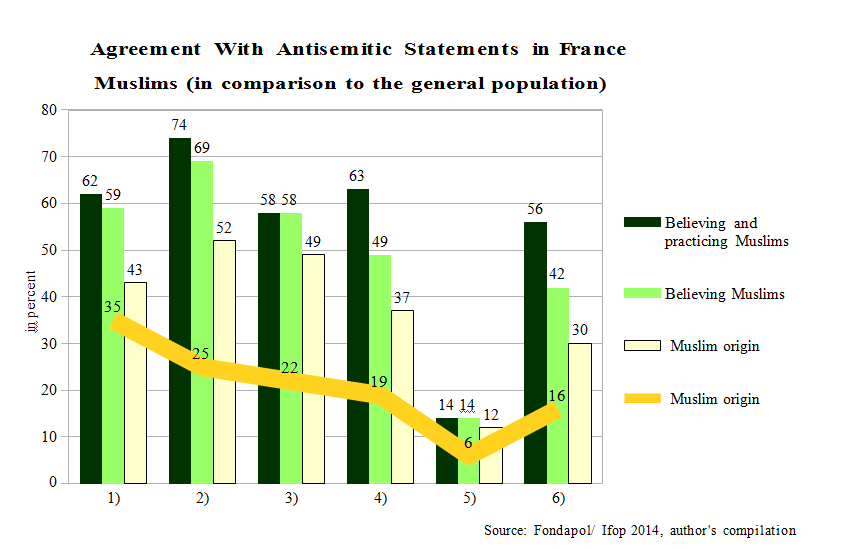
The level of antisemitism can also be measured in the number of
antisemitic statements that individuals agree with. Individuals can be regarded
as very antisemitic if they agree to all six or five of the above statements.
Individuals’ antisemitic attitudes seem to be more fragmented if they agree
only to one or two items. I consider that agreeing to at least four of the
above statements shows a consistency in antisemitic beliefs across different
areas of antisemitic stereotypes; an antisemitic belief system is very likely.
Graph 4 illustrates the results for the general population in France,
Front National and Front de Gauche sympathizers, and Muslims. The exact numbers
can be found in Table 4. 15 percent of the general population in France, 22
percent of Front de Gauche sympathizers, 38 percent of Front National
sympathizers, and 46 percent of Muslims agreed with four or more of the six
antisemitic statements. This leads to the conclusion that almost half of the
French Muslims are likely to adhere to an antisemitic belief system.
However, there are major differences with level of religiosity,
illustrated in Graph 5. Sixty percent of “believing and practicing Muslims”
agreed to at least four of six antisemitic statements. The number dropped to 43
percent among believing but not practicing Muslims and was “only” 30 percent
for those who declared themselves to be of Muslim origin (and not believing
Muslims). The number is still high compared to the general population (15
percent) but lower than within the group of Front National sympathizers (38 percent).
While the majority of the French population (53 percent) does not agree with
any of the six antisemitic statements, only 17 percent of Muslim interviewees
do not agree with any of the six antisemitic statements.
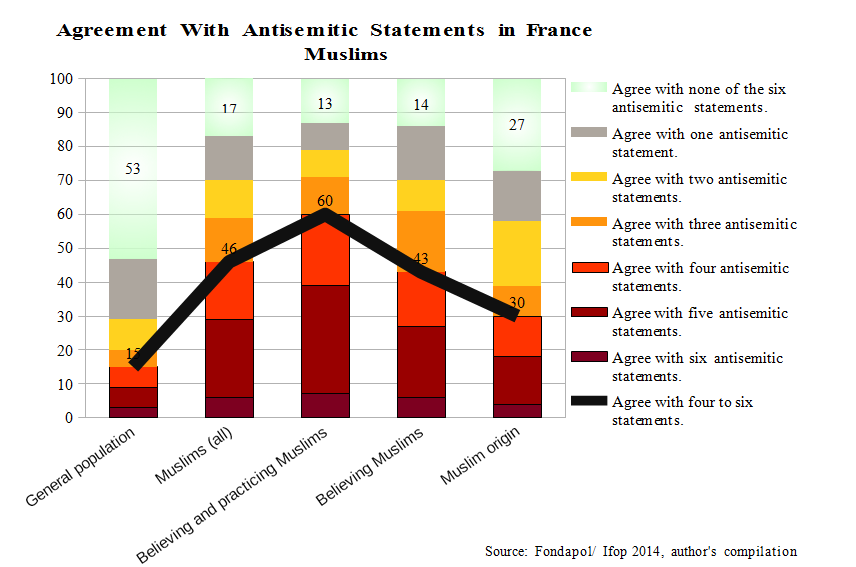
The strong correlation between antisemitic attitudes and Muslim
socialization, Islamic belief and practice indicates that these are major
factors for antisemitic attitudes. What other correlations exist?
The Fondapol study found a correlation in the general population between
antisemitic attitudes and a lack of trust in the French parliament, the State,
the European Union, trade unions, and school. However, trust in these
institutions is not lower but somewhat higher among Muslims than the general
population. Gender differences exist both among Muslims and the general
population. Nineteen percent of men and 11 percent of women in the general
population and 52 percent of men and 41 percent of women in the Muslim sample
agreed to at least four of the six antisemitic statements. Age seems to have
some influence but there is no linear tendency and patterns are different from
the general population (see Graph 6 and Graph 7). The Muslim age group with the
lowest level of antisemitism is 3549 years old. The age groups in the general
population with the least antisemitic attitudes are 1824 years and 2534
years, after the age group of 75 years and older.
Differences between workers and employees as well as professionally
active and inactive interviewees are low both in the Muslim and the general
sample. The influence of the level of education remains unclear for the Muslim
sample, whereas antisemitic attitudes slightly decrease with the level of
education (with the baccalauriat) in the general population. Muslims without
any formal degree are even more likely (26 percent) to disagree with all
antisemitic statements than all Muslims (17 percent). There is a tendency of
slightly decreasing antisemitic attitudes with the level of income for those
who agree with at least 4 of six antisemitic statements (from 50 percent to 42
percent among Muslims and from 21 to 11 in the general population). Regional
differences are interesting: antisemitic attitudes are slightly more pronounced
in the general population in and around Paris than in the rest of France,
whereas antisemitism among Muslims in and around Paris is no different from the
rest of France taken together. However, Muslims in the northwest of France seem
to harbor lower levels of antisemitism (only 28 percent agreed to at least for
out of six antisemitic statements). Another major influence seems to be the
national identity, but results are complex (see Graph 8). The percentages of
Muslims with Moroccan and French nationality who agree with at least four of
six antisemitic statements are almost identical (46 and 44 percent), lower than
Muslims with Algerian nationality (58 percent) and higher than Muslims with
other nationalities (35 percent), but only 12 percent of Muslims with Moroccan
nationality agree with none of the six antisemitic statements, compared to 18
and 17 percent of those with French and Algerian nationality.
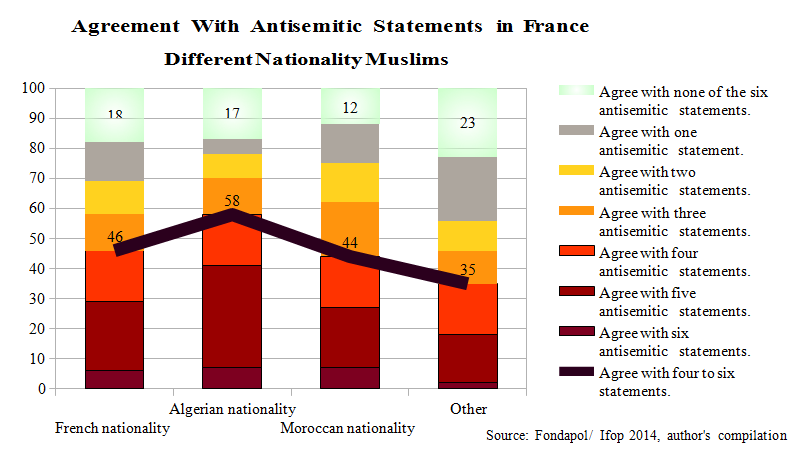
Contrary to intuition, the effect of knowing Jews personally is minimal,
both for the general population and Muslims, see Graph 9 and Graph 10.
Fifty-five percent of the general population who do not know any Jews
personally, and 51 percent of those who do, disagree with all antisemitic
statements. However, the percentage of those who agree to at least four of six
antisemitic statements is slightly higher among those do not know any Jews
personally (18 percent) than average (15 percent). Among Muslims, those who
have Jews as close friends are somewhat less likely (41 percent) to agree to four
of the six antisemitic statements than average Muslims (46 percent). However,
those who know Jews personally are somewhat less likely to disagree with all
antisemitic statement (16 percent) than those who do not know any Jews
personally (19 percent).
The Fondapol study also revealed that direct Holocaust denial18 is low
both among Muslims and the general population (5 and 3 percent). However, 35
percent of the Muslim population and 29 percent of the general population
diminished the Holocaust when they agreed to the statement that the Holocaust
is “one drama among others during the [Second World War] war that caused many
victims”, instead of describing it at as a “monstrous crime” (58 and 63 percent
respectively). Twenty-four percent of the Muslim sample and 12 percent of the
general population disagreed that the Holocaust should be taught to younger
generations to avoid its repetition. The large majority of both samples agreed
(67 and 77 percent). Hostile attitudes towards Zionism are common, particularly
among Muslims. Fifty-seven percent of the Muslim interviewees, 25 percent of
the general population, 32 percent of Front National sympathizers, and 28
percent of Front de Gauche sympathizers agreed that “Zionism is an
international organization that aims to influence the world and society for the
benefit of the Jews.” High approval rates can also be found in responses to the
statement “Zionism is a racist ideology.” Forty-six percent of the Muslim
interviewees, 23 percent of the general population, 23 percent of Front
National sympathizers, and 44 percent of Front de Gauche sympathizers agreed.
Negative views of Israel are confirmed in another survey for the CNCDH from
December 2013.19 Forty percent of the French population declared that they have
a negative view of Israel, while only 26 percent had a positive view. Negative
views of Israel were more common among the political Right than the left. The
CNCDH survey also found that antisemitic attitudes were significantly more
common among those who have negative views of Israel but antisemites are
divided into those who have negative, positive, or neither positive nor
negative views of Israel.
Other surveys from European countries confirm that anti-Jewish
attitudes are stronger among Muslims than among the general population, even
though more surveys are needed to establish the differences on a representative
national level in various European countries. In Germany, Katrin Brettfeld and
Peter Wetzels included one item on antisemitism in their questionnaire
completed by 2,683 high school students, including 500 Muslims, in Cologne,
Hamburg, and Augsburg; they found that 15.7 percent of Muslims of migrant
background, 7.4 percent of non-Muslims of such background, and 5.4 percent of
non-Muslims without any background of migration strongly believe that “people
of Jewish faith are arrogant and greedy.”20 Another study, also commissioned by
the German Ministry of the Interior, focused on radicalization of young Muslims
(14 – 32 years old) and surveyed 200 German Muslims, 517 non-German Muslims, and
a representative sample of 200 young non-Muslim Germans in 2009 and 2010. The
questionnaire included two items on antisemitic attitudes, both related to
Israel: (1) “Israel is exclusively to be blamed for the origin and continuation
of the Middle East conflicts,” and (2) “It would be better if the Jews would
leave the Middle East.” About 25 percent of both German and non-German Muslim
participants and less than 5 percent of non-Muslim Germans agreed to both
items. Antisemitic attitudes varied between different ethnic and religious
groups.21 A survey published already in 1997 asked youths of Turkish background
if they think that Zionism threatens Islam; 33.2 percent agreed that it does.22
Jürgen Mansel and Viktoria Spaiser conducted a detailed survey23 in 2010 in
which they surveyed 2,404 high school students with different backgrounds in
Bielefeld, Cologne, Berlin, and Frankfurt. Antisemitic attitudes related to
Israel, religious antisemitism, classic antisemitism, and equations between
Israel and the Nazis were significantly higher among Muslim students, and Arab
students in particular, than among other students.24 Religious antisemitism was
measured with two items: 15.2 percent of students with Turkish background, 18.2
percent of those with Arab background, and 20.8 of those with Kurdish
background completely agreed with the statement, “In my religion they warn us
against trusting Jews.” Only 2.8 percent of those without any migrant
background did so. Similarly, 15.9 percent of students with Turkish background,
25.7 percent of those with Arab background, and 16.7 of those with Kurdish
background completely agreed with the statement, “In my religion, it is the
Jews who drive the world to disaster.”
However, Muslim students showed less anti-Jewish attitudes related to
so-called “secondary” antisemitism (“I am fed up with hearing about the crimes
against the Jews”). The authors noticed a correlation between antisemitic
attitudes and religious fundamentalism among Muslims. Another study from 2012
conducted in Germany also found that Muslims endorse classic antisemitic
statements more often than their non-Muslim counterparts; approval of
“secondary” antisemitism, which is related to the Holocaust, was slightly
weaker.25
A 2009 study from Denmark by the Institute for Political Science at
Aarhus University conducted interviews with 1,503 immigrants with Turkish,
Pakistani, Somali, Palestinian, and (former) Yugoslavian backgrounds, as well
as 300 ethnic Danes. Analysis of the study revealed that a number of
antisemitic stereotypes are significantly more common (up to 75 percent) among
immigrants than among ethnic Danes (up to 20 percent). The study also showed
that anti-Jewish attitudes are more widespread among Muslim than among
Christian immigrants.26
In Brussels, 2,837 students in 32 Dutch-speaking high schools were
polled. About half of the Muslim respondents agreed with the following
statements:
1. “Jews want to dominate everything” (total,4 percent; Muslims, 56.8
percent; non Muslims, 10.5 percent).
2. “Most Jews think they’re better than others” (total, 9 percent’ Muslims,
47.1 percent; Non-Muslims, 12.9 percent).
3. “If you do business with Jews, you should be extra careful” (total, 6
percent; Muslims, 47.5 percent; non-Muslims, 12.9 percent).
4. “Jews incite to war and blame others” (total,4 percent; Muslims, 53.7
percent; non-Muslims, 7.7 percent).
The antisemitic attitudes were unrelated to low educational level or
social disadvantage.27 Mark Elchardus confirmed the findings two years later in
2013 with a study of 863 students from Ghent and Antwerp, including 346 Muslim
students. While 45–50 percent of Muslim students revealed antisemitic
attitudes, “only” about 10 percent of non Muslims did so.28
In 2013, 937 teachers in the Netherlands participated in a survey about
antisemitic attitudes and Holocaust diminishment among their students. Both are
vastly more common in schools with a higher percentage of students of Turkish
or Moroccan background (who are predominantly Muslim). In schools with under 5
percent of students with Turkish or Moroccan background, 28 percent of the
teachers reported that their students made hurtful remarks about Jews or
diminished the Holocaust once or a few times during the preceding year. In schools
where the student population is over 25 percent Turkish or Moroccan, 43 percent
of the teachers gave this answer. Interestingly, when we exclude insults made
in the context of the Middle East or soccer, the percentage of insults against
Jews is also significantly higher in schools with many students of Turkish or
Moroccan background. According to teacher reports, perpetrators with Moroccan
or Turkish backgrounds are overrepresented, forming 10 and 8 percent of the
perpetrators, respectively, while the figure stands at 3 percent for both
student groups in the Netherlands.29
A comprehensive survey published in 2004 (2005 in English) in Sweden
analyzed the results of more than 10,000 questionnaires filled out by pupils
that included six items on antisemitic attitudes. Muslims showed the highest
percentage of strong antisemitic attitudes with 8.3 percent versus 3.7 percent
among Christians, but were followed closely by those considering themselves
nonreligious (7.6 percent). The survey also revealed significant differences
among male and female respondents; 12.9 percent of Muslim boys were found to be
“intolerant” toward Jews but only 4.8 percent of Muslim girls were reported as
such.30 The Fondapol study from France showed gender differences both for the
sample of the general population and Muslims whereas the study by Wolfgang
Frindte et al. on young Muslims in Germany found no gender differences.31
Conclusion
The review of surveys from different European countries demonstrates
that the level of antisemitic attitudes is significantly higher among Muslims
than among non-Muslims, although many European Muslims do not share
antisemitic beliefs. The level of antisemitism rises with the level of
religiosity and with fundamentalist interpretations of Islam.
Notably, demographic and socioeconomic variables, that is, the
educational level, age, gender, social disadvantage, discrimination, or legal
restrictions of Islamic practice, cannot explain the differences between
Muslims and non-Muslims. This refutes the widespread assumption that Muslim
antisemitism is a reaction to discrimination or suppression.
The surveys considered are strong evidence that current interpretations
of Muslim identity and belief are major sources for hatred against Jews.
Further research should identify which particular interpretations of Muslim
identity and Islam are prone to antisemitic beliefs and, perhaps more
importantly, which are not. A distinction between Islamism and Islam is surely
important, but might be insufficient: Although antisemitism is particularly
strong among fundamentalist and believing and practicing Muslims, the level of
antisemitism among less religious Muslims is still higher than in the general
population.
Differences related to country of origin indicate the influence of the
latter on views of Jews.
————————————————————————————————————————————————
1 These figures are based on the annual reports by the Commission nationale consultative des droits de l’homme (CNCDH) in France and the Community Security Trust (CST) in Great Britain. For a detailed discussion see Günther Jikeli, European Muslim Antisemitism. Why Young Urban Males Say They Don’t Like Jews, Studies in Antisemitism (Indianapolis: Indiana Univ Pr, 2015), 33–41.2 global100.adl.org
3 PEW GLOBAL ATTITUDES PROJECT, Little Enthusiasm for Many Muslim Leaders, 2010.
4 Jikeli, European Muslim Why Young Urban Males Say They Don’t Like Jews.
5 The survey was conducted before the war in Lebanon between Israel and Hezbollah in summer Attitudes were therefore not influenced by this war.
6 A single item is unlikely to grasp complex antisemitic attitudes in a comprehensive wa Antisemitic attitudes are expressed by individuals (and groups) in different and sometimes distinct ways. Therefore, surveys on antisemitism usually use a number of items.
7 According to regular surveys conducted by the Anti-Defamation League from 2002 to 2013, around 50 to 60 percent of the Spanish populations believes that it is probably true that “Jews have too much power in the business world” and 50 to 70 percent believe that “Jews have too much power in international financial ”
8 Ruud Koopmans, “Religious Fundamentalism and Hostility against Out-Groups: A Comparison of Muslims and Christians in Western Europe,” Journal of Ethnic and Migration Studies 41, 1 (January 2, 2015): 33–57, doi:10.1080/1369183X.2014.935307.
9 For a definition of these categories see Ibid.
10 Ibid., 51.
11 Ruud Koopmans, “Religious Fundamentalism and out-Group Hostility among Muslims and Christians in Western Europe” (presented at the 20th International Conference of Europeanists, Amsterdam, June 25, 2013), http://www.wzb.eu/wp-content/uploads/old/u8/ruud_koopmans_religious_fundamentalism_and_out-group_hostility_among_muslims_and_christian.pdf.
12 Dominique Reynié, L’antisémitisme dans l’opinion publique française. Nouveaux éclairages (Paris, France: Fondapol, November 2014).
13 Nonna Mayer, “Il faut parler d’antisémitisme avec rigeur,” Le Monde, December 6,
14 Due to legal restriction of collecting data on religious affiliation, the French government does not publish statistics that would allow to construct a representative sample based on quotas of the Muslim However, the Fondapol study uses official INSEE statistics on migrants and data from other Ifop surveys (of 80,000 interviewees altogether) to construct quotas on gender, sex, age, occupation, region and size of the municipality of residence.
15 The study distinguishes between sympathizers of the Front National and those who voted for the Front National leader Marine Le Pen in the last presidential elections in Those who voted for Marine Le Pen have only slightly less antisemitic attitudes on average than Front National sympathizers. It shows that Le Pen’s electorate still adheres to antisemitic believes although she tries to distance herself from open antisemitic positions.
16 Commission nationale consultative des droits de l’homme (CNCDH), La lutte contre le racisme, antisémitisme et la xénophobie. Année 2013 (Paris: La Documentation Française, 2014), 184, 471.
17 There is an error in the numbers given in the Fondapol report on item The percentage of agreement among “believing and practicing Muslims” must be higher than 58 or the percentage of agreement of all Muslims to item 3 must be lower than 61 to be arithmetically correct.
18 Measured with the two items: The Holocaust is: 1) “exaggerated; people died, but far less than what is said” 2) “an invention; all this has never existed.”
19 Survey conducted by the BVA (Brulé Ville et Associs) Institute for the CNCDH ( Commission nationale consultative des droits de l’homme). Commission nationale consultative des droits de l’homme (CNCDH), La lutte contre le racisme, antisémitisme et la xénophobie. Année 2013.
20 Brettfeld and Wetzels, Muslime in Deutschland, 274-275.
21 Frindte et , Lebenswelten Junger Muslime in Deutschland, 227-247.
22 Wilhelm Heitmeyer, Joachim Müller, and Helmut Schröder, Verlockender Fundamentalismus: türkische Jugendliche in Deutschland (Frankfurt am Main: Suhrkamp, 1997), 181,
23 Jürgen Mansel and Victoria Spaiser, Abschlussbericht Forschungsprojekt (Final Research Project Report) SozialeBeziehungen, Konfliktpotentiale und Vorurteile im Kontext von Erfahrungen verweigerter Teilhabe und Anerkennung bei Jugendlichen mit und ohne Migrationshintergrund (Bielefeld, 2010), http://www.vielfalt-tut- de/content/e4458/e8260/Uni_Bielefeld_Abschlussbericht_Forschungsprojekt.pdf and http://www.vielfalt-tut-gut.de/content/e4458/e8277/Uni_Bielefeld_Tabellenanhang.pdf.
24 These attitudes were measured with the following items: “Because of the Israeli policies, I increasingly dislike Jews”; “Regarding Israel’s policy I do understand if one is against Jews”; “In my religion they warn us against trusting Jews”; “In my religion, it is the Jews who drive the world into disaster”; “Jews have too much influence in the world”; “What the State of Israel is doing with the Palestinians is principally nothing else than what the Nazis in the Third Reich did with the Jews”; “The Jews in all the world feel more strongly attached to Israel than to the country where they live”
25 Decker, Kiess, and Brähler, Die Mitte Im Rechtsextreme Einstellungen in Deutschland 2012, 79.The study found “primary” antisemitism among 11.5 percent of the overall population and 16.7 percent among Muslims, but 23.8 percent of “secondary” antisemitism among the overall population and 20.8 percent among Muslims. However, the poll included only 86 Muslims out of a sample of 2,510 people.
26 Peter Nannestad, “Frø af ugræs? Antijødiske holdninger i fem ikke-vestlige indvandrergrupper i Danmark,” in Danmark og de fremmede: om mødet med den arabisk-muslimske verden, Tonny Brems Knudsen, Jørgen Dige Pedersen, and Georg Sørensen (Århus: Academica, 2009), 43-62; Svend Andersen et al., Danmark og de fremmede: om mødet med den arabisk-muslimske verden (Århus: Academica, 2009).
27 Mark Elchardus, “Antisemitisme in de Brusselse Scholen,” in Jong in Bevindingen Uit de Jop- monitor Brussel, ed. Nicole Vettenburg, Mark Elchardus, and Johan Put (Leuven; Den Haag: Acco, 2011), 265-296.
28 Antisemitic attitudes were somewhat stronger among “conservative Muslims” than among “progressive ” Nicole Vettenburg, Mark Elchardus, and Stefaan Pleysier, eds., Jong in Antwerpen En Gent (Leuven; Den Haag: Acco, 2013), 187-222.
29 Eva Wolf, Jurriaan Berger, and Lennart de Ruig, Antisemitisme in het voortgezet onderwijs (Amsterdam: Anne Frank Stichting, 2013), 16, 21, 31.
30 The Living History Forum, Anti-Semitic, Homophobic, Islamophobic and Xenophobic Tendencies among the Young(Stockholm: Brottsförebyggande rådet [BRÅ], 2005), 59 and 152-153,http://www.levandehistoria.se/files/INTOLERANCEENG_0.pdf.
31 Frindte et , Lebenswelten Junger Muslime in Deutschland, 222.





